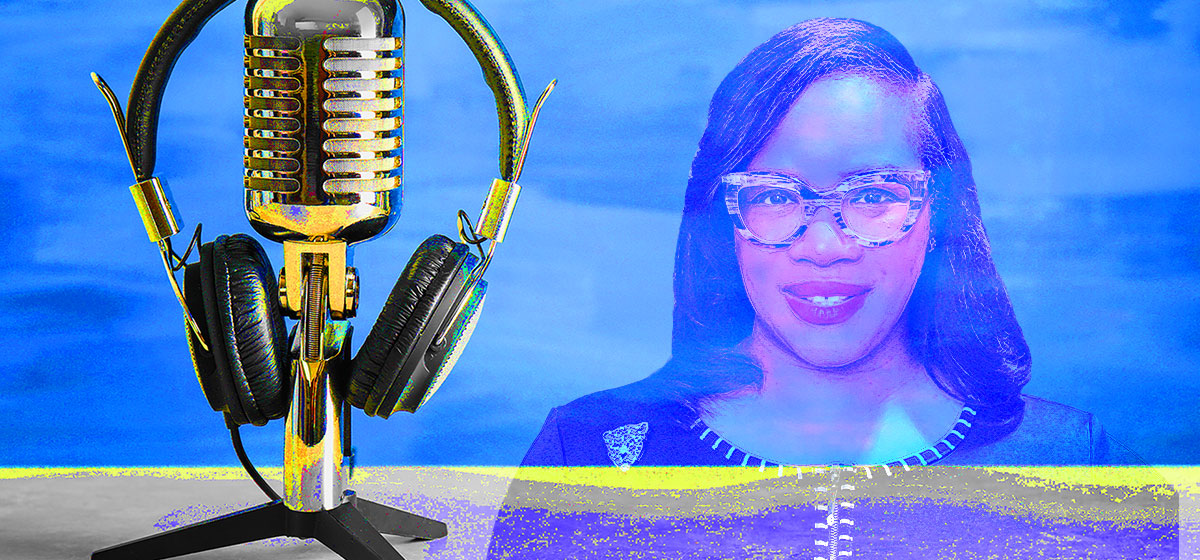Pittsburgh Tomorrow Podcast: Diamonte Walker, URA of Pittsburgh Deputy Executive Director

Donald Bonk interviews Diamonte Walker, deputy executive director of the Urban Redevelopment Authority of Pittsburgh, as part of the Pittsburgh Tomorrow podcast series. The transcript is abridged and edited for clarity.
View the episode archive here. Read Diamonte Walker’s full bio here.
“A lot of folks didn’t believe that Pittsburgh would become what it is. I believe what’s going to happen next and if you believe, you have to prepare for it.” —Diamonte Walker
We began recording the voices of Pittsburgh Tomorrow in January through early March as a new decade fueled excitement about the future of our community. We delayed publishing the interviews, however, during the pandemic shutdowns. Now, it is too soon to know how the virus, it’s economic aftermath and the recent protests and riots will alter the macro trends shaping Pittsburgh’s future. The world has changed in ways still unknown, but the issues facing Pittsburgh remain, still awaiting our need to address and solve them. Please join us weekly to discover the bold, imaginative and transformative ideas that will build Pittsburgh Tomorrow.
Donald Bonk: Welcome to Pittsburgh Tomorrow. I’m Donald Bonk. I’m here at the Urban Redevelopment Authority of Pittsburgh with deputy executive director, Diamonte Walker. Welcome. I want to give the audience a little bit about your background.
Diamonte Walker: Thank you for the interview. I love talking about how we shape a brighter Pittsburgh for tomorrow. I was born and raised here in the historic Hill District. So I’ve seen the city over the last few decades and I’ve worked my way, navigating the city and the multitude of changes it’s experienced over the last few decades. And I’m a proud Pittsburgher. Proud Hill District resident.
My family came here from the South in the late 1890s and landed in the Hill District. We’ve been there ever since. Theirs is a very entrepreneurial story, really wrapped around the American dream and coming to Pittsburgh with the promise of steel and what steel could present for a young black family. I live on the very same street that they purchased their first home. That’s where my husband and I purchased our first home. We didn’t know that until we looked at the census records.
I grew up with real values around education and being hard working and most importantly, being a good neighbor and looking out for the folks to your left, and to your right, and taking care of your family.
I’m new to the nonprofit and public sector. I spent most of my career in a hyper for-profit environment, working for banks and law firms. I found my way into the nonprofit community and economic development space and have sort of latched onto this work because it is driven by personal mission and professional mission. I’m very humbled to be able to serve in the capacity that I serve. And I’m always thinking about Pittsburgh’s residents and stakeholders and how I can use this role to really make sure that they are getting a return on their investment.
I came to the URA in 2017 as the MWBE (Minority and Women Owned Business Enterprises) Program Officer, looking at how the agency was engaging diverse entrepreneurs. And then I started to take on an expanded role around performance and compliance, so what is the agency doing on some other markers that mean something to the health and vitality of Pittsburgh, and measuring that.
We had some change in leadership here and the board asked me to step up into a deputy role to help prime the organization for new thought leadership and to be an integral part of that team.
What I lend to the agency is that thought leadership and vision, understanding what it means to be a native Pittsburgher, what matters to Pittsburghers most, what did it mean for somebody like me growing up in the Hill District and what does it mean for somebody growing up in District Two, and what is the common thread and the common desire between all of that?
How do we use economic development tools, housing intervention strategies and business development strategies to really make sure that when we talk about creating a Pittsburgh for all, it’s not just a great soundbite that sounds good on a radio show, but it’s something that people live, feel and experience, and that they see as a part of their children’s inheritance?
That’s a little bit of what I do. But if you had to ask me the nuts and bolts, it’s an operations role: Making sure that the trains leave on time and making sure that we are a responsive, responsible and dynamic future-facing organization.
Bonk: So now we’re going to talk about Pittsburgh Tomorrow. What would make Pittsburgh the best city in the world—or one of them—but also the ideal city? Think of the two dimensions: best city, ideal city. Can you talk a little bit about your version of Pittsburgh in those terms?
Walker: I’m a native Pittsburgher myself, so if you ask me about Pittsburgh, I think this is the best city in the world. However, as a black Pittsburgher, that conversation gets a lot tougher. And so we do have this thing in this city where it feels like two Pittsburghs: There is black Pittsburgh and then there is this other Pittsburgh. How do we converge the two? And how do we make sure that when Pittsburgh finds itself one of the most livable cities for all, you know, on Forbes magazine, that when you ask somebody, everybody feels like that rings true?
That’s part of what drives me. Everybody deserves to feel like Pittsburgh is a phenomenal city because it is. And it can be, but part of what I think Pittsburgh has to do, and what’s really integral to a brighter tomorrow, is sort of accepting that we’re not going to be Atlanta. We’re not going to be D.C. We’re going to be Pittsburgh. And to really double down on what that means.
Pittsburgh is really changing and evolving. And those conversations are happening in real time. Some of them are tough. Some of them are fun. But I think that if we roll up our sleeves, and we really make a commitment to sort of living up to our highest ideals, we’ll get this right, and we will be a model for the country. We could be a model for the globe.
Bonk: We’ll go a little different direction now. This is a moonshot question, of which I am personally a fan. The moonshot question has two sides to it as well. One side is you’ve got one chance to change—one really big change. And the second part: How does that affect or change the narrative of Pittsburgh in terms of identity to the outside world, but also internally? So, thinking in those terms, what do you believe is the moonshot idea for Pittsburgh?
Walker: I think the moonshot idea for Pittsburgh is twofold. Part of it, I think, is really focusing on existing Pittsburghers and folks who have already gone all-in on Pittsburgh, and really figuring out how we ensure a material return on investment for those folks that have been here for quite a while and do not want to be pushed out of their neighborhoods. And so one of the things that I think can be really helpful is doubling down on affordable home ownership to keep people in neighborhoods.
Bonk: So if you pass wealth down, if you invest in your home, you take care of it. You get the mortgage, pay it off. Now, it’s a wealth asset in the family.
Walker: Yes, in the family, and that asset can be passed down generation to generation. That’s an important part of our place keeping. We have to keep the place feeling like Pittsburgh. That’s what makes Pittsburgh special. And then, we know that we’re going to have an influx of newcomers. And Pittsburgh is a welcoming city. We want newcomers to come here, but that can have a disruptive effect on folks that are not yet participating in this new economy.
And so we’ve got to do two things. We’ve got to figure out how to fully engage and fully optimize the existing talent that we have, and also do the moonshot that brings new folks here. I talk a little bit about being black in Pittsburgh and what that means and being very proud of Pittsburgh, but also having to deal with the heft and the weight; this gets challenging. And so I think about this national call to action to all of the historic black colleges and universities to say, “Pittsburgh is where you want to land. Pittsburgh is where you want to be. It’s a thriving place.” It’s going be hard to do that if we can’t model and show what we’re doing with our existing black city community. This is not about race as much as it is being a native Pittsburgher and being given some of the opportunities that you certainly want as a native Pittsburgher.
One of the things that I’ve been thinking about is our inspiration gap. Pittsburgh can do anything. I believe that. We need to inspire our residents. We need to inspire our business community and inspire our leadership to really start doing this thing of thinking about tomorrow. What does the inheritance look like? You know, 20 years from now, when you open this thing up, what do we bequeath to future generations? Can we be proud of that? That’s a little bit of what I’m focused on right now.
Bonk: Now we’re going go to the last question. 1990 and 2050 are equidistant in time. I was 27 in 1990. I’ll be 87 in 2050. Looking at that time transformation, can you give me three practical things in the next three decades that can improve, transform and make Pittsburgh better?
Walker: One of the things we really need to get focused on is corporate social responsibility. What is the give back? What is the play within our corporate community to sort of quantify, qualify and match the investment of the public sector? To match the investment of residents, stakeholders, local communities, and to really understand what role they play in our ecosystem, defining that role and making an ask? Because I think there is a willingness there. But really pulling together a strategy.
When you look at us before 1990, the industry built the neighborhoods right now. Their workers had to live somewhere. They had to have a certain quality of life. When my grandfather got up in the morning, he drove the chauffeur carriage for Mr. Joseph Gimbel. And you can see him in his top hat and he took pride in his work. He was inspired.
He was out to win the day. All Pittsburgh residents want to be out to win the day. It’s how we’re engaging them and how we’re talking about them. I would love to see us do the Amazon commercial for Pittsburghers, to make the case for why we should all double down again on our investment. What does it mean for the corporate community to start to play in that? How do we start to do this together? I think that’s sort of the 2020 to 2030.
We’ve got to become a greener city. We need better air quality. We need better water. And we need a healthier environment. We need to look at some of our neighborhoods that are struggling, in some of our neighborhoods that are teetering, and make sure that we are not presenting a false choice between stagnation and gentrification.
Revitalization is sort of that sweet spot; that’s the Goldilocks scenario. What does revitalization look like? Responsible, inclusive growth. How do we make sure that we are engaging at every single level, whether it’s artificial intelligence, whether it’s the Internet of things? Are we going into neighborhoods and preparing people for what is Pittsburgh’s new steel? Are they ready for that? We’ll be doing this by hologram in 2050, right? Is everybody in Pittsburgh going to be prepared to participate in that world?
Our responsibility right now is that preparation work: Inspiring people to that and belief. A lot of folks didn’t believe that Pittsburgh would become what it is. I believe what’s going to happen next and if you believe, you have to prepare for it.
Bonk: Yes, if you have real faith, you take action in this way. Even when things aren’t visible, they’re visible internally in terms of the vision. Is there anything else that you’d like to add to this thought exercise, but also a creation exercise? We’re creating thoughts that we hope will be the blueprint for the textbook of tomorrow.
Walker: I would tell us to look at the non-obvious places. I’m pretty sure that in 1990, nobody was looking in the Hill District for somebody like me to get to say what I need to say, or to talk about the world from my view. And so here I am now. So what I want to make sure is that we’re listening to the voices in the non-obvious places. I think they hold the best of what Pittsburgh has to offer. So I would challenge us to do that—to not look only at the professional layer when we’re talking about these things, but look at all the voices. They can tell us what’s broken faster than we can compile the data and figure it out. We should be ears to the ground listening to that indigenous front line.





